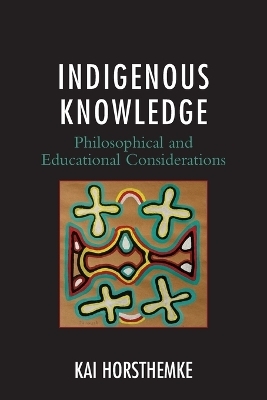
Indigenous Knowledge
Philosophical and Educational Considerations
Seiten
2023
Lexington Books (Verlag)
978-1-7936-0418-7 (ISBN)
Lexington Books (Verlag)
978-1-7936-0418-7 (ISBN)
Indigenous Knowledge provides all educators, especially indigenous educators, with theoretical tools for critical reflection and interrogation of their own and others’ preconceptions. The book challenges our conception of knowledge as a tool in anti-discrimination and anti-repression discourse with profound educational consequences.
Although the manifestation of what is taken to be indigenous knowledge could presumably be traced back roughly to the origins of humankind, the idea of indigenous knowledge is a fairly recent phenomenon. It has arguably gained conceptual and discursive currency only over the past half century, with a veritable slew of conferences, workshops, special journal editions, and anthologies devoted to the topic. Yet, there has been no treatise that offers a comprehensive, critical examination of this notion. Accounts of indigenous knowledge usually focus on explanations of “indigenous,” “local,” “traditional,” “African” and the like – but to date not a single defense of indigenous knowledge has bothered to explain the particular understanding of “knowledge” the authors are working with. Indigenous Knowledge: Philosophical and Educational Considerations’s critique of the idea of indigenous knowledge should in no way be understood as an endorsement of the evils of colonial conquest and (ongoing) exploitation, oppression, and subjugation. Nor should it be taken as an indication of a failure on the part of the Kai Horsthemke to sympathize with the struggle of indigenous peoples the world over for a dignified and sustainable way of life, for personal and communal space, and for self-determination. The aim of the book is to provide especially “indigenous” educators with theoretical tools for critical reflection and interrogation of their own and others’ preconceptions, assumptions, and epistemic practices and customs.
Although the manifestation of what is taken to be indigenous knowledge could presumably be traced back roughly to the origins of humankind, the idea of indigenous knowledge is a fairly recent phenomenon. It has arguably gained conceptual and discursive currency only over the past half century, with a veritable slew of conferences, workshops, special journal editions, and anthologies devoted to the topic. Yet, there has been no treatise that offers a comprehensive, critical examination of this notion. Accounts of indigenous knowledge usually focus on explanations of “indigenous,” “local,” “traditional,” “African” and the like – but to date not a single defense of indigenous knowledge has bothered to explain the particular understanding of “knowledge” the authors are working with. Indigenous Knowledge: Philosophical and Educational Considerations’s critique of the idea of indigenous knowledge should in no way be understood as an endorsement of the evils of colonial conquest and (ongoing) exploitation, oppression, and subjugation. Nor should it be taken as an indication of a failure on the part of the Kai Horsthemke to sympathize with the struggle of indigenous peoples the world over for a dignified and sustainable way of life, for personal and communal space, and for self-determination. The aim of the book is to provide especially “indigenous” educators with theoretical tools for critical reflection and interrogation of their own and others’ preconceptions, assumptions, and epistemic practices and customs.
Kai Horsthemke is associate professor at the University of the Witwatersrand and the University of the Western Cape, both in South Africa, and at KU Eichstätt-Ingolstadt in Germany.
Contents
Preface
Introduction
1The Idea of Indigenous Knowledge
2Relational Epistemology and the Idea of Epistemological Diversity
3An Analysis of Knowledge and Epistemology
4A Critique of Indigenous Knowledge
5Ethnomathematics
6Indigenous Science
7Traditional Ecological (or Environmental) Knowledge
8Morality, Knowledge, and Local Values
9Epistemic Justice, Recognition, and Rights
10An Applied Epistemology for the Real World
References
Index
About the Author
| Erscheinungsdatum | 12.04.2023 |
|---|---|
| Verlagsort | Lanham, MD |
| Sprache | englisch |
| Maße | 154 x 223 mm |
| Gewicht | 440 g |
| Themenwelt | Sozialwissenschaften ► Pädagogik ► Allgemeines / Lexika |
| Sozialwissenschaften ► Pädagogik ► Bildungstheorie | |
| ISBN-10 | 1-7936-0418-5 / 1793604185 |
| ISBN-13 | 978-1-7936-0418-7 / 9781793604187 |
| Zustand | Neuware |
| Haben Sie eine Frage zum Produkt? |
Mehr entdecken
aus dem Bereich
aus dem Bereich
Eine neues Menschsein für die Welt von morgen
Buch | Softcover (2023)
Vahlen (Verlag)
CHF 34,85
Einführung in die Theorie transformatorischer Bildungsprozesse
Buch | Softcover (2023)
Kohlhammer (Verlag)
CHF 47,60


